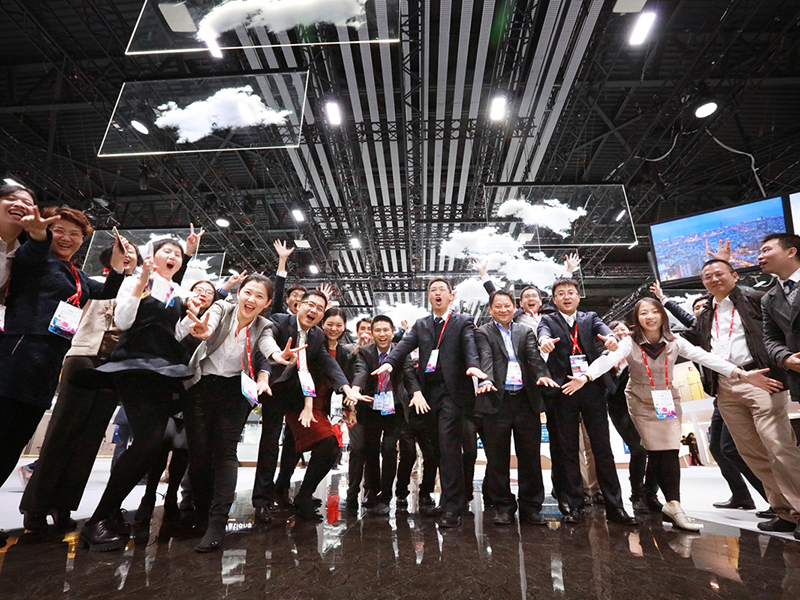By David De Cremer and Patrick Mancel
Since being founded in 1987 in Shenzhen by Ren Zhengfei, Huawei serves today more than three billion customers worldwide. To remain competitive as the top provider in the business, Huawei puts a strong emphasis in making a difference in the lives of both their employees and customers. They do this by fostering an intellectual work climate within their organisation.
It is often said that it is lonely at the top. Those in the highest leadership position know this all too well. At the same time, they also know that for their leadership to be effective, they need to rely on and collaborate with others. In the last two decades, the scholarly literature on leadership has moved from a focus on the leader as a unique individual with specific traits to a focus on the leader as someone who is part of the collective and in the process of representing that collective builds positive and trusting relationships with others to promote everyone’s interests. In this sense, leaders can only be effective through the efforts of those they lead, making that leadership has to be regarded as a two-way process. For this reason, leaders need to create circumstances in which they use their influence and power to make others perform better, contribute to their well-being and happiness, and even make those others wealthier.
Research has indeed shown that money can make people happy, but primarily so when they are able to spend it on others.1 Because primarily those with more influence and power possess more financial resources, the happiness of those in leading positions in a sense thus depends on making others wealthier. That is, sharing one’s wealth with others makes oneself happy. In a similar way, leaders can feel less lonely, happier and more effective, if they serve the (financial) interests of their followers. This two-way process in turn makes leaders more legitimate in the eyes of their followers and fosters compliance and cooperation. As a result, followers are more willing to help achieving the goals and purpose communicated by the one in charge. It is this ability to make followers accept a common purpose and its related values that make that leaders remain in the collective memory and exert influence on the long-term. Or, as a Chinese saying goes, “every generation has its heroes and each may lead the way for decades.”
One specific type of influence of leaders that helps to serve the long-term interests of organisations is to promote and develop the thinking of employees and foster an intellectual work climate. The ability and freedom of independent thought makes people experience a sense of autonomy and execution power that has a significant impact on how their career and life develop. Like the old Chinese saying goes: “give a man a fish and you feed him for a day; teach a man to fish and you feed him for a lifetime.” It is therefore no surprise that John F. Kennedy once noted that the engagement to “leadership and learning are indispensable to each other.” By intellectually stimulating your employees, they think more deeply about the purpose of the company they work for and in turn decisions become meaningful. Based on this process, it stands to reason that promoting employees’ intellectual capabilities in understanding the purpose of the business will deliver better customer service.
One company that has brought the relationship between promoting intellectual exchanges among employees and enhanced customer service to life in the display of their leadership is the Chinese telecom giant Huawei. The company was founded in 1987 in Shenzhen by Ren Zhengfei and serves today more than three billion customers worldwide. Huawei has never gone public – remaining an employee-owned company – and in the fiscal year of 2017 Huawei’s revenue reached CNY603.621 billion (U.S.$92.549 billion) and CNY56.384 billion (U.S.$7.276 billion) in net profit.
Huawei’s leadership focus on customers
Saying that providing the best customer service is an important value to Huawei is an understatement. Ren Zhengfei clearly puts that “serving customers is the only reason Huawei [even] exists.” The ambition for Huawei employees is therefore clear, which is “to serve their customers.”2 It is for that reason that Huawei considers the judgments and needs of their customers as their compass to navigate in an increasingly more competitive world. Making customers the focus of his company, Ren Zhengfei considers it important that in his leadership he elevates the abilities of Huawei employees to impress their customers by asking those employees to explicitly adopt high standards, focus on different scenarios and opportunities for the company and its customers, and give engaging presentations to inspire customers to remain loyal.
For his employees to embrace this strategy, Ren Zhengfei leads in ways that create a work culture in which intellectual values are placed centre-stage. To achieve such an intellectual work culture, Ren Zhengfei acts as a teacher spending time with his employees while sharing references of books to read, discussing tactics and providing even life lessons. For example, Ren Zhengfei has mentioned several times in his speeches to Huawei employees that a book on International Business Law was the most impressive one he ever read. He considered this book as a very important summary of society which clearly describes channel management, agent management, the rights of agents as well as many other topics and recommended that everyone should read it. Ren also often uses references to past historic events and the suffering of man in life. For example, in speeches, Ren Zhengfei sometimes refers to his visit to the Voortrekker Monument in Johannesburg, which honours the Dutch immigrants who spent 19 years moving from Cape Colony to the continent’s interior in the 19th century. The hard life of these Dutch immigrants is used as a continuous inspiration to understand why Huawei needs to show commitment and suffering to be the best in customer service.
Ren Zhengfei once pointed out that an intellectual culture can be regarded as a bucket of paste that ties employees togethers in the pursuit of the goal to provide the best service to customers. This bucket of past consists of a mix of ideas, explorations of philosophies, promoting sensitivities to differences between cultures, and being aware of the important values in business and life. Such an intellectually rich exchange requires an appetite to go broad and not only zoom in on one’s own expertise and areas of interest. In line with this idea, executives at Huawei are indeed encouraged to read both specialised and non-specialised books to foster an intellectual climate. The notion of the power of thinking in Huawei thus relates strongly with the ambition to install a learning orientation, which responds to the need to stay updated and open to any changes in customer demands and preferences. It is this kind of attitude that will ensure the best service provision possible.
In fact, according to Ren Zhengfei, Huawei will only be able to respond to threats and pressures if the company builds a culture where people’s minds are the main asset and resource to rely on. The importance of thinking, in his view, is that it provides the skills to connect the dots needed to work with an agile vision and strategy. In other words, learning and thinking prepares the mind and thus the company for when change and corresponding strategies are needed. Considering this assumption that Huawei needs well-prepared strategists, Ren Zhengfei urges that employees working at the Consumer-focussed departments must literally study the earlier mentioned book international business law. For most of them he explained that reading the simplified version would suffice in preparation for the exam these managers will have to take on this book. For Ren Zhengfei it is important to: “Never forget to self-reflect. The secret to survive as a company is self-reflection. We must gradually improve our thinking and our corporate culture through self-reflection and self-iteration.”
Promoting the power of thinking creates success
Huawei’s belief of the power to think as one of the most important assets companies have available is built on the idea that innovation without a solid academic foundation is never going to become big business. It is just messing with the details. This belief is to some extent fuelled by the emotions of its founder. Specifically, Ren Zhengfei feels that the Internet age has created a generation of inflated ideas in China’s young people and therefore fears that serious scientific research is lacking these days. The only way to achieve great leadership is therefore to do some hard learning. He believes in the idea that nothing is as practical as a good theory. It is only through diligent study that one can truly understand theories relevant to business. However, through practice, one can further promote in-depth understanding. In other words, theory gives direction to practice. But theory without practice is weak. As Ren Zhengfei noted: “In the past, our older craftsmen gained experience through a lot of practice and became top-level craftsmen in that way. Tireless hands-on work only allowed them to know how to do their job well. But practice guided by theory is how we can really become goal-oriented.” And, the most important goal for Huawei is to satisfy the needs and demands of its customers.
To provide the best service possible to customers requires that employees think in creative and innovative ways in promoting the quality of the company’s products and the long-term strategies used to remain competitive as the top provider in the business. Promoting an intellectual work climate can help in achieving these outcomes in several ways. First, by being more knowledgeable about one’s own field of expertise and in addition being able to see the usefulness of this knowledge in a broader perspective helps to install creative mindsets. Indeed, by reading books and articles on broader topics than only one’s expertise helps to facilitate seeing different solutions to the same problem. In other words, promoting a culture of thinking and intellectual exchanges contributes to people’s ability to engage in mental accounting. Mental accounting helps people to imagine situations that do not exist yet and how they could affect one’s business goals. Second, the skill of mental accounting helps those in leadership positions to act in more anticipating ways. Such type of pro-active leadership has been suggested to be positive in terms of avoiding the establishment of a feeling of inertia in the organisation.4 Or, put differently, being able to anticipate challenges and alternative approaches helps the company to keep moving on in agile ways. Third, the experience of reading books – both fiction and non-fiction – has been shown to increase people’s ability to understand better the ways other people think and as such helps in (a) thinking in more creative and adaptive ways, and (b) managing more successfully social relationships, including those with customers. Our own research even shows that those in leadership positions reading literary fiction makes them more humble and fairer towards others.5
Taken together, effective leadership is about making others better in a variety of ways. One important skill that leaders can foster is the ability to gather knowledge, think in deep ways and ultimately reflect to become more creative and effective in their interactions with others. Using knowledge to be of better service to customers is a strategy employed and demonstrated by Huawei and its founder. Given the present status and level of success achieved by the company it stands to reason that this approach indeed has made a difference in the lives of both their employees and customers.
Featured Photo: Celebrating Huawei’s successful show at Mobile World Congress 2017
Photo Source: www.huawei.com
About the Authors
 David De Cremer is the KPMG chaired professor in management studies at the Judge Business School, University of Cambridge, UK, and an affiliate at the Justice Collaboratory at Yale Law School, Yale University. He has published over more than 250 academic articles and book chapters and is the author of the book Pro-active Leadership: How to overcome procrastination and be a bold decision-maker and co-author of “Huawei: Leadership, culture and connectivity”.
David De Cremer is the KPMG chaired professor in management studies at the Judge Business School, University of Cambridge, UK, and an affiliate at the Justice Collaboratory at Yale Law School, Yale University. He has published over more than 250 academic articles and book chapters and is the author of the book Pro-active Leadership: How to overcome procrastination and be a bold decision-maker and co-author of “Huawei: Leadership, culture and connectivity”.
 Patrick Mancel has been a lawyer for 22 years in the areas of real estate contracts and law with a specific interest in developing trustworthy and legitimate decision-making procedures enacted by a variety of authorities. He is currently a law entrepreneur assisting and advising the organisation and re-organisation of justice service means to a wide variety of companies.
Patrick Mancel has been a lawyer for 22 years in the areas of real estate contracts and law with a specific interest in developing trustworthy and legitimate decision-making procedures enacted by a variety of authorities. He is currently a law entrepreneur assisting and advising the organisation and re-organisation of justice service means to a wide variety of companies.
References
1. Dunn, E.W., Gilbert, D.T., & Wilson, T.D. (2011). “If money doesn’t make you happy, then you probably aren’t spending it right.”Journal of Consumer Psychology,21, 115-125.
2. Tian, T., De Cremer, D., & Chunbo, W. (2017). Huawei: Leadership, culture and connectivity. Sage Publishing.
3. De Cremer, D. (2018). “Know your history! Why historical awareness makes you a better leader.” The Political Anthropologist.
4. De Cremer, D. (2013). “The proactive leader: How to overcome procrastination and make a bold decision now.” Palgrave Macmillan.
5. Moore, C., Oc, B., & De Cremer, D. (2018). “Literary fiction reading and humble leadership.” Paper in preparation, Bocconi University.




































































